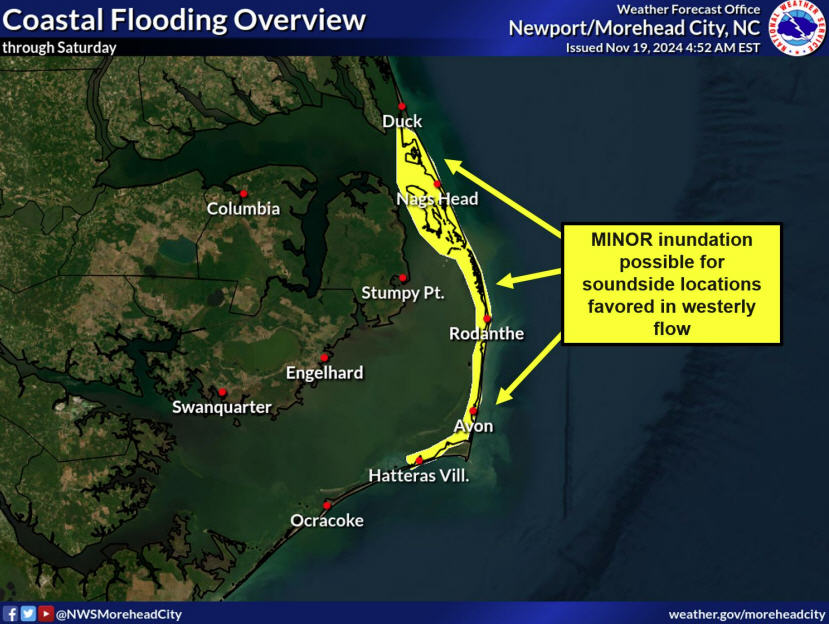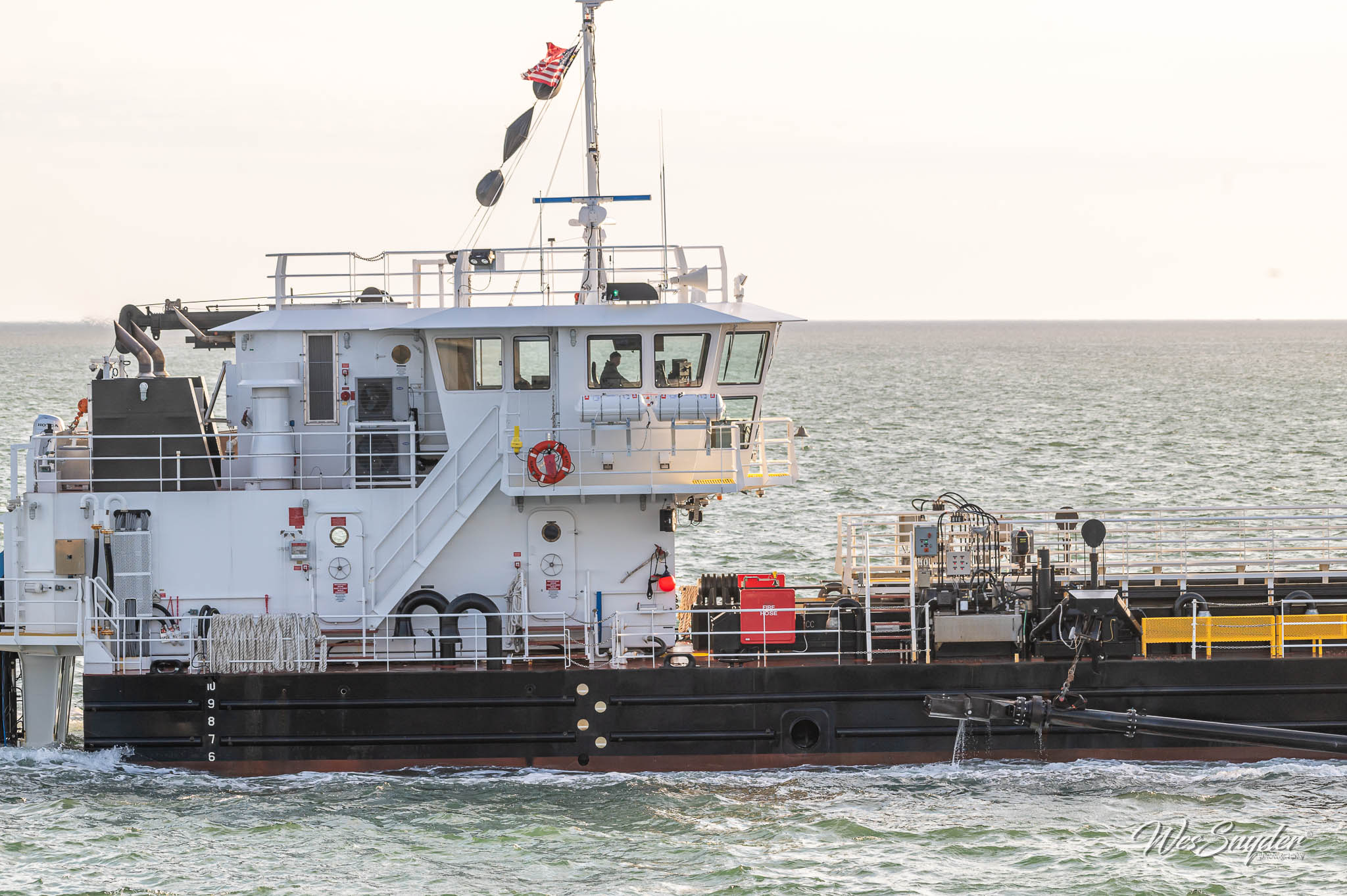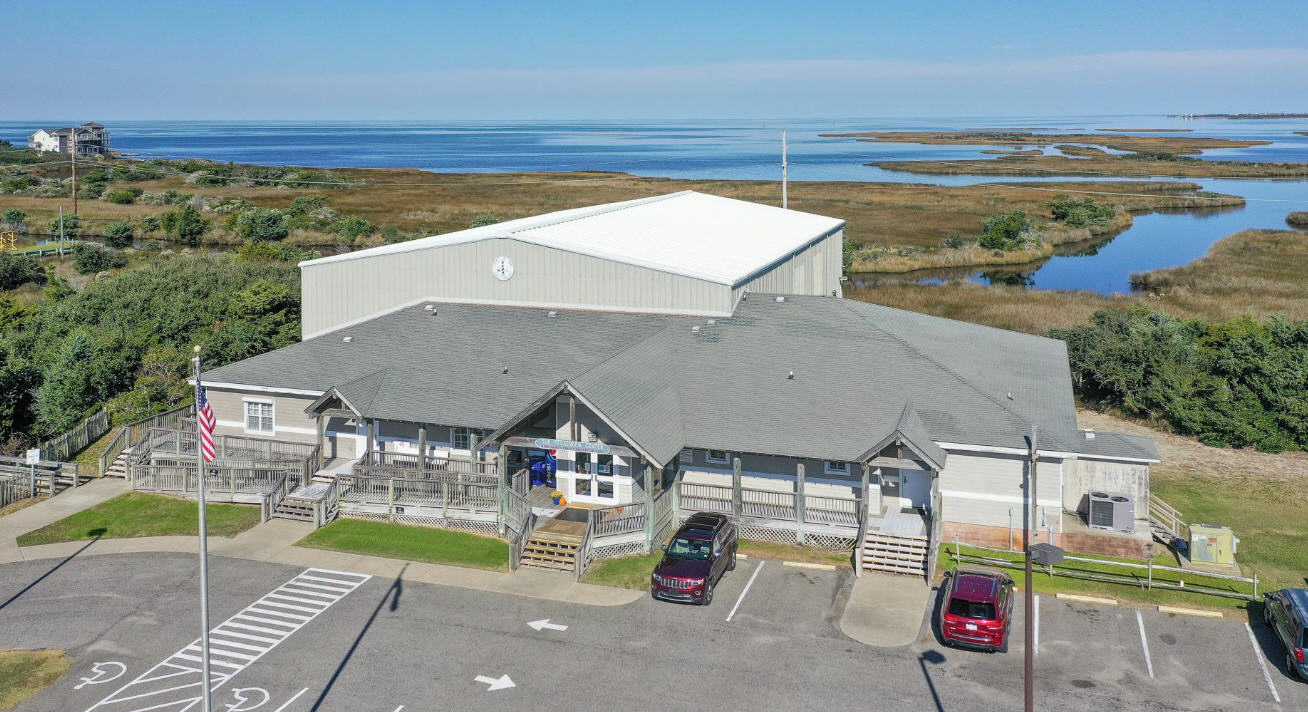Picking up and starting all over in Hatteras village:One couple’s story of tragedy and recovery
“This is where our house used to be, right here,” Debbie Hodge said, pointing to a barren stretch of sand. She could have been standing on any beach on the island, and it would have looked the same, just empty.
It was the fall of 2003, and Debbie was then 51 and her husband, Cliff was 53. They had lived on the eastern edge of Hatteras village for 17 years. This is where they raised their two children — a daughter, Allison, and a son, J.C. They had never had storm tide in their home, even during Hurricane Emily in 1993, which caused horrific soundside flooding in Hatteras village, Frisco, Buxton, and Avon.
That all changed on Sept. 18, 2003 when storm surge and violent ocean waves from Hurricane Isabel obliterated several homes and businesses on the village’s edge. The home of Cliff and Debbie Hodge was one of them. They lost everything.
“Got some green grass growing,” Cliff noticed.
He had put a barrier around his septic tank to protect it from the heavy equipment that had been working in the area since the storm. Sprouts of grass were working their way up through the sand. Many of the nearby lots looked just like the Hodges’ — devoid of any signs of what was there just weeks before.
“Our sister-in-law’s trailer was over here,” noted Debbie, motioning to her left, “and it was the first one to go.”
“Then Taste Buds went off,” Cliff added. “Then Carl Lambert’s house. Ours was the last one.” He figured that was because of the way their mobile home was positioned – perpendicular to the ocean.
The day before Isabel, Debbie snapped two pictures of their mobile home before they left to weather the storm at the Community Building in Hatteras. Now, they are the only two pictures the couple has of their home. The pictures hadn’t been developed when the Federal Emergency Management Agency came to take applications for hurricane aid.
“He wanted pictures of the house, but I told him we don’t have a house any more,” she said. “All we have is a vacant lot. So he said give him a picture of a vacant lot.”
Debbie and Cliff walked around their sandlot, remembering where the cedar trees used to be. Across the marsh lay the twisted chassis of their trailer. In front of the chassis was a truck that had been mutilated by surge and waves. In any direction you looked, there was devastation.
Debbie noticed paw prints in the sand. The family had been looking for its cat, Lawrence, since the hurricane. The prints gave them hope that he was still alive. Neighbors saw Lawrence riding on the roof of the Hodge’s trailer as it floated by. Different folks have reported seeing their tomcat since the storm. Cliff and Debbie are still hopeful that he will show up.
The Hodge family has spent the time since the storm searching the area for pieces of their lives. Their trailer was painted green. On the ridge behind Austin Lane, they found small scraps of green siding, which is where Cliff figures the trailer broke up. Part of the roof is still floating out in the sound. Cliff found the front porch railings, but he hasn’t yet searched the area for more belongings because of a 6-foot wide cut in the land.
“We had an air conditioner that was the size of a hood of a truck, and we haven’t found it,” Cliff said.
A neighbor did find Debbie’s birthstone ring, which she had left in her kitchen on a cabinet. She had just bought the ring a couple of months before the hurricane. It was lying on the ground under a cedar tree near Betty Austin’s house.
Cliff has been going along the shore side and checking the tide line for belongings. J.C. and Cliff found some dishes, the VCR, and guns that Cliff had inherited from his father, who died in April. Other than that, not much of anything that belonged to the family has been found.
“Unless it’s buried under other debris, it’s either out there on the reef or in Rodanthe,” Cliff said and laughed heartily.
The evening before the storm, after their windows were boarded up and the cars relocated to higher ground at the airport in Frisco, Cliff and Debbie took their sleeping bags to the Community Building to spend the night. Their son had gone to Greenville for the storm.
About 15 people stayed in the building, including Debbie’s parents.
“I have never left the island for a storm, never,” Debbie said. “Born and raised here.”
However, the couple had never gone through a storm in their mobile home. They had always stayed with family in the village.
“This one {hurricane} had so much wind and everything, we figured the community building would be a little safer,” Debbie said.
Debbie’s father, Damon “Junior” Gray, worked for the National Weather Service for 30 years. Because there was some question when the storm would hit, he wanted his family to spend the night before at the Community Building. He wanted to be sure they got there in case the tide came in early. Debbie and Cliff just took a change of clothes for a couple of days, assuming that they were going home the night after the hurricane passed to stay in their home.
“And sleep in our own bed,” Cliff chimed in.
Cliff remembers that he really didn’t notice the storm raging outside the Community Building unless someone opened the door. Then he realized that something was very wrong.
“The water was coming from the wrong direction into the village,” he said. “Where most of the time, it would come from the soundside. It was backwards.”
When the storm started to subside in mid-afternoon that Thursday, Glen Cartwright and Cliff drove towards the edge of the village to see what happened. They made it as far as the Pelican’s Roost when Shane Austin, Debbie’s cousin, stopped them.
Cliff remembers Shane saying, “There’s no need in trying to go out any farther because your place is gone.”
“Gone?” Cliff asked.
“There is nothing there,” Shane answered. “Absolutely nothing there.”
It was Cliff’s birthday. This wasn’t a very good gift. It was also Debbie Lambert’s birthday. She lived near the Hodges and had also lost her home.
Cliff waited until 4 a.m. to walk to “ground zero” from the Community Building. His wife went about four hours later.
Debbie said that she was in shock before she got to their land. The farther she walked, the worse it looked. The Pelican’s Roost, Seagull Motel, and the Sisler house — all were destroyed.
“It blew my mind that it could happen like that,” Debbie remarked. “I didn’t expect it.”
She cried a lot. She still cries.
“I believe that there is a reason for everything,” Cliff said philosophically, “good or bad as they may be. I don’t know what the reason is, may never know. We will pick up and start all over.”
THE RECOVERY
Like many families in Hatteras village after Hurricane Isabel, life was bleak for the Hodges. They had lost their home with all its contents, and they were stuck on the wrong side of the new inlet formed by the hurricane. Both of their vehicles were on the other side where they had moved them for safekeeping. The storm had also rendered the couple jobless. Debbie has provided child care services for 30 years, and Cliff worked for Beach Contractors in Buxton. Because of the storm, neither of them was able to work.
Cliff was worried that he would have to leave Hatteras to find a job to support his family. There wasn’t a lot to keep him in Hatteras village. He knew his wife would never leave her home. He went to Bert Austin, the former sheriff of Dare County who lives in the village, for advice and help.
“I told him I don’t have a home. If you can find something for me to do, okay,” Cliff said of his conversation with Bert. “If not, I’m going to have to leave for work.”
Very shortly, Margie Easley, who was helping to coordinate hurricane aid for the county, offered Cliff a job working for the United Methodist Men. The church group got him a dump truck and a backhoe to help people in the village. Because of the piled up sand and large sinkholes that covered the village, folks were having difficulty in getting to and from their homes. Some driveways were completely washed out. So Cliff went to work and had a pay check in the first week after the storm. That job lasted two weeks.
The clothing issue was addressed quickly. People in the village gave them clothes.
“The Red Cross jumped right in and gave us a clothing allowance, $130 per person,” Cliff said. “Belinda Willis of Lee Robinson’s General Store handed us clothes right off the shelf — flip flops, whatever we needed.”
“Scott Busbey of Natural Art Surf Shop in Buxton sent J.C. a care box with shoes, shorts, what kids wear,” Debbie added. “Different teachers gave him gift certificates…for clothes and sweatshirts.”
Cliff has hopes of finding some of his clothes as he continues to search the area.
When they left their home on Sept. 17, he had a pile of T-shirts on his dresser and was sure he would find some of them.
“Nothing,” Cliff said flatly. “Not even a pair of underwear flying in the trees. A clean sweep.”
Since they were without their vehicles until the road was repaired, the family was also given three bicycles to use to travel around town. Cliff had his father’s 1999 green Ford pickup to use, too. He just left the keys in it so anyone who needed to use it didn’t have to ask.
J.C. is staying with friends on the other side of the inlet to be closer to school and other activities. For now, Debbie and Cliff are staying in a house in the village. It is the private beach home of their long time friends, James and Judy Long from Tarboro. The two couples were neighbors for 16 years in Frisco.
“They told us to stay here as long as we need it,” Debbie offered.
“We have already found out that we are not tree people,” Cliff said with a laugh. “We are used to hearing the wind blow and the ocean roar. The place we’re at is completely dark.”
On their land on the edge of the village, they were very close to Highway 12. There were street lights and car lights. They could even see the Cape Hatteras Lighthouse from their back porch.
“It’s unbelievable how much help the other side has been,” Debbie said. “The Salvation Army, the Baptists, the locals in Buxton, Frisco and Avon.”
Right now, the Hodges feel that there is nothing anybody can do for them. They have no place to store anymore than what they have. Already, they have been given very useful items, such as a TV, microwave, toaster oven, and blankets. Th
e house they are staying in is completely furnished.
Even though they had a home to live in, they didn’t have electricity for several days, water for three weeks, and cable television for five weeks.
“You don’t really realize how necessary water is until you have to carry five-gallon cans of water up the stairs to flush the toilet,” noted Cliff.
The county provided portable showers, beginning the week after the storm. Cliff helped the man who was installing them. It was late at night, and they were short some pipe. Cliff knew he had a piece of water line on his property that would work. The two drove out to get it when a deputy pulled up and informed them that they were breaking curfew.
“So?” Cliff responded. “We are on my property.”
Cliff laughed as he told the story because there was nothing for anybody to steal.
They drove away quickly with the piece of pipe not knowing if they were going to get shot or pulled over for a ticket. Neither happened. The pipe worked and so did the showers.
“It had been six or seven days since I had a shower. I didn’t care what time it was. I was ready to take a shower. And it was a good shower, really nice with hot water, soap and good pressure.”
Debbie eventually got a temporary job working for the county. She answered the phone five days a week at the Community Building. She also tracked and got permission for vehicles to come over on the ferries from the mainland.
Before she got the job working for Dare County, Debbie volunteered to help at the Community Building. She was included in a feature on “hurricane heroes” in The Virginian-Pilot.
“I didn’t have anything to do,” she said of her days of volunteering to help others. “Didn’t have a house to clean or to pull carpet out of.”
Again, Cliff’s sense of humor showed as he interjected, “Our yard was already cleaned up!”
Immediately following Hurricane Isabel, volunteers were needed to serve food, answer questions, keep track of supplies, give out water and so forth.
“I could do that,” Debbie said. “There’s a lot of hurricane heroes.”
Cliff also got a temporary job working for the county. He monitored the debris that was being dumped temporarily on the Slash Creek Condominiums development site. “I sit in the tower,” Cliff explained.
Under their temporary home in Hatteras village, next to the bikes they were given, are three fish boxes and a warped canvas painting done by their daughter when she was in high school. In these three partially filled boxes is every belonging they could find after Hurricane Isabel — a cookie jar, Debbie’s cast iron frying pans, a snow globe, trophies belonging to their kids, a few pieces of Depression ware, and some dishes they had received as a wedding gift 32 years ago.
“What survived and what didn’t was really funny,” observed Debbie.
The canvas painting was behind the couch in the living room. It had washed up and was in the debris line in the woods. Yet, they didn’t find anything from the living room.
Cliff pulled a jar from a fish box with the words “Amazing Grace” imprinted on the outside. Debbie had gotten it for her 50th birthday with money in it. Cliff rummaged some more and retrieved a church plate and old soft-drink bottles. They had a collection of them before the storm.
“It’s nothing but junk,” Debbie sighed, “but it’s our junk.”
When the water goes down more, they plan to take a clam rake to search the marsh for more belongings. For now, they are worried about snakes and broken glass from the windowpanes in their trailer.
THE FUTURE
The county has told the Hodges that they can put a home back on their lot. They were told that their land is worth a lot of money because of its proximity to the ocean. They could sell it and profit enough to buy another lot and build a house, but that is something the family doesn’t want to do. It is their home. It is family land, given to them by Debbie’s father, where they are surrounded by immediate family.
Though it will put them in debt, they hope to build a house on the same place where their mobile home was.
“We will go up on pilings,” Debbie said emphatically. “Just a house that will fit in with the landscape.”
“Three bedroom, two bath,” Cliff added, “whatever we can get.”
They have insurance that will help them rebuild.
“The insurance company done us good,” Cliff said. “They paid us for what the trailer was worth. They paid us a certain amount of money for the contents, outside structures, porches and decks.”
It won’t be enough money to rebuild their home, so they also applied for an SBA loan to help them out. Cliff feels that it still won’t be enough money. They are counting on getting the rest of the money from the bank. They filled out forms to apply for grant money from other organizations, and they weren’t sure if they qualified for any aid from FEMA.
“The insurance money will be a good down payment on the house,” Cliff said.
Cliff and Debbie have no fears about rebuilding on the same site where their home was so completely destroyed by a hurricane.
“We’re used to the water,” Cliff said.
Debbie added, “This may never happen again in our lifetime.”
The Hodges’ land is close to the site of Durants Lifesaving Station, which was built in 1878 and survived for 125 years on the beach and even made it through the 1933 hurricane, which cut an inlet in the same place that Hurricane Isabel did. Unfortunately, the old lifesaving station was destroyed by Isabel, but some feel that it may be a very long time before Hatteras village sees another storm like that one.
For now, Debbie and Cliff Hodge are thankful for what they have. No lives were lost, and everything they had that was destroyed can be replaced.
“We’ve kind of taken this real good because if you dwell on it very long,” Cliff said “it kind of makes you sick. We’ve viewed it as a good house cleaning.”
(This article was first published in the December 2003 editor of The Island Breeze. Cliff and Debbie Hodge did build a new house on their land on the eastern edge of Hatteras village and still live there.)












